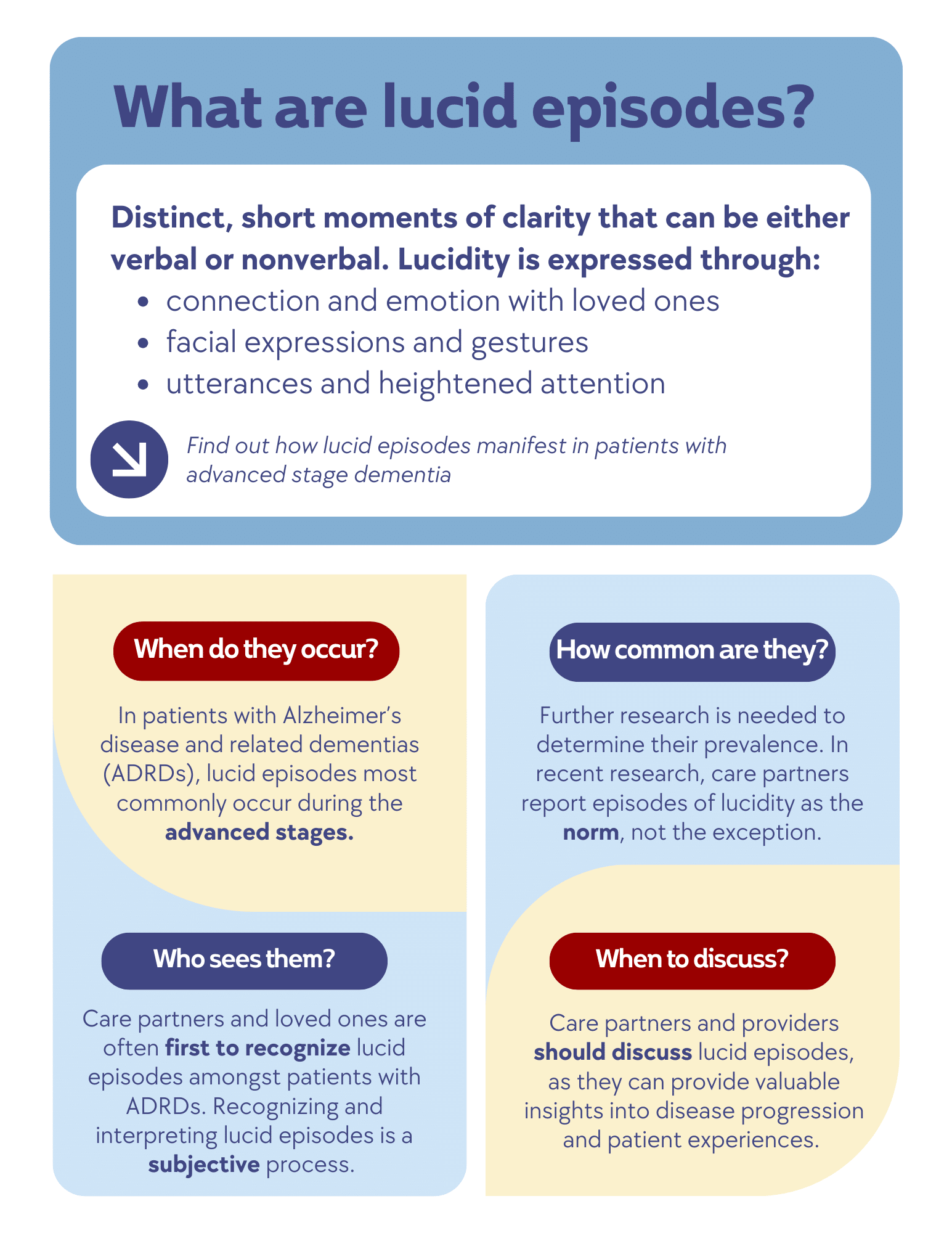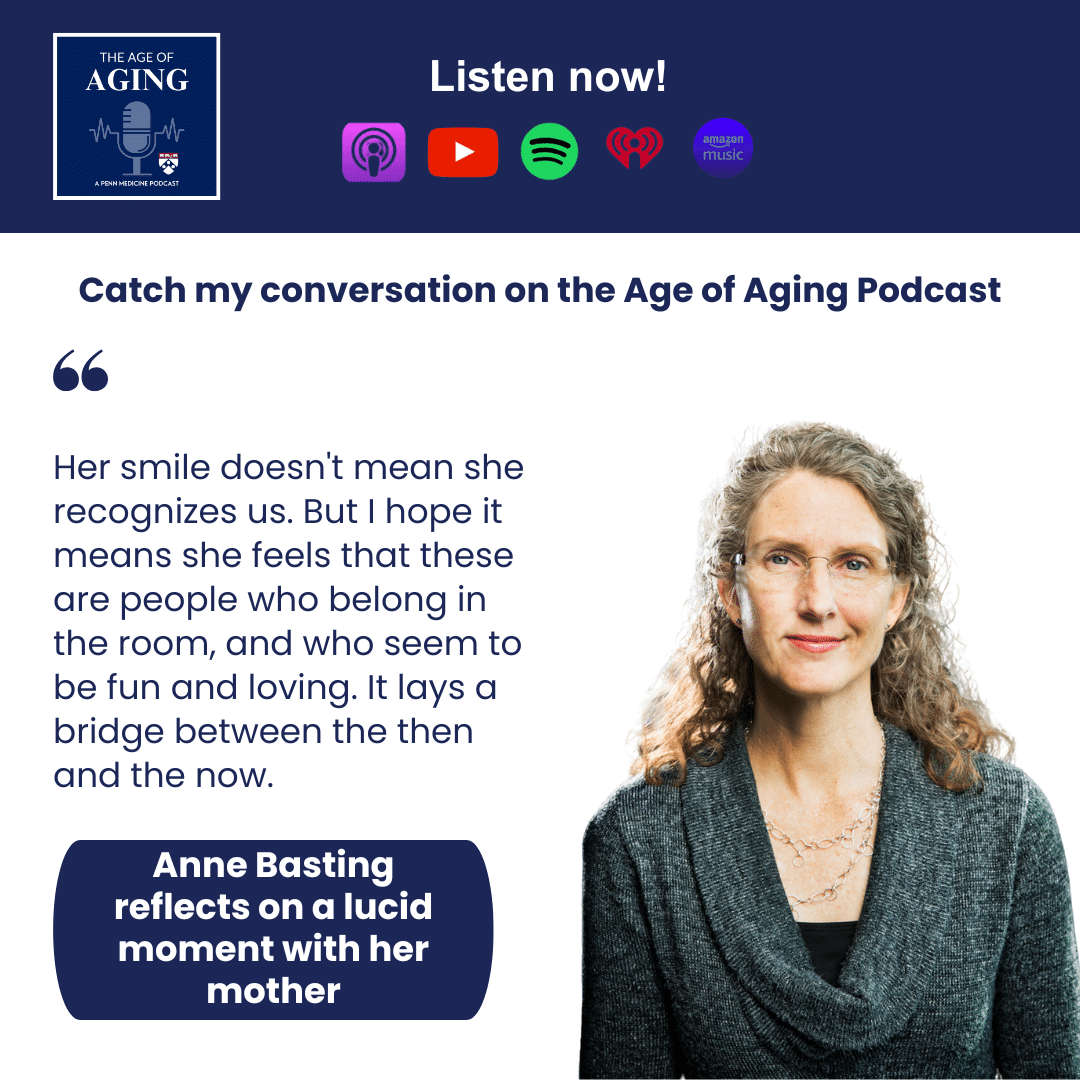By Meghan McCarthy
Lucid episodes in dementia describes moments of unexpected clarity in individuals with Alzheimer’s disease and related dementias (ADRDs). These episodes, which may be verbal or nonverbal, can evoke deep emotional responses from caregivers and other loved ones. Experts, Jason Karlawish, MD, co-director of the Penn Memory Center, and Justin Clapp, PhD, MPH, assistant professor of Anesthesiology and Critical Care and Medical Ethics and Health Policy at the Perelman School of Medicine, discuss the nature, frequency, and implications of these episodes.
What are lucid episodes in the context of dementia?
Lucid episodes are distinct moments of clarity that can be either verbal or nonverbal. For some individuals, these episodes manifest as unexpected expressions of deep empathy, recognition, or connection, particularly toward loved ones. For others, lucidity is observed through facial expressions, eye movements, gestures, and heightened attention that are atypical in advanced-stage dementia.
The duration of these episodes varies, but they are often fleeting, lasting seconds or minutes. They may involve a single word, a gesture, or a brief series of interactions.
- Dr. Clapp: “Researchers have conceptualized paradoxical lucidity with a focus on linguistic complexity—for example, a person who is otherwise nonverbal suddenly forming sentences. However, episodes are not always linguistically sophisticated; instead, they are often remarkable for their sensitivity to context.”
Who experiences lucid episodes and when do they occur?
Lucid episodes occur in patients with Alzheimer’s disease and related dementias (ADRDs) during the advanced stages. One specific form, terminal lucidity, occurs in the final days or hours of life. However, patterns regarding the timing of lucid episodes remain under-researched.
Care partners and loved ones are often the first to recognize and interpret these episodes. The way a lucid episode is understood depends on a caregiver’s knowledge of their loved one’s typical cognitive abilities and overall dementia severity.
Lucid episodes can evoke both profound meaning and deep sorrow for caregivers. Previous studies suggest that caregivers view these moments as both a poignant reminder of their loved one’s personality and an indication of the ongoing struggle with dementia.
- Dr. Clapp: “For individuals living with advanced dementia, you can interpret these episodes based on how they think about language, mind, and social interaction. Cultural differences may also shape how these moments are understood.”
- Dr. Karlawish: “There is a tragic nature to these episodes. Caregivers do not assume their loved one is ‘back to normal’—instead, these moments often deepen their awareness of the ongoing struggle with dementia.”
How common are lucid episodes?
The prevalence of lucid episodes is not well established due to limited research and inconsistent reporting. Many healthcare providers do not routinely ask about these experiences, and caregivers may either not recognize or be unwilling to report them.
- Dr. Clapp: “These kinds of episodes are relatively rare by definition. However, in caregiver surveys and interviews, reports are quite common. Some studies estimate that between 60% and 100% of caregivers have observed them.”
- Dr. Karlawish: “Care partners report episodes of lucidity as the norm, not the exception.”
Where and when lucid episodes should be discussed
Care partners should discuss lucid episodes with their loved one’s clinical care team. These discussions can provide valuable insights into the patient and caregiver’s experiences.
- Dr. Karlawish: “I now routinely ask caregivers about episodes of unexpected communication or connection, particularly in patients with advanced disease and aphasia. Caregivers are often eager to share their observations.”
Is Lucidity truly paradoxical?
The term paradoxical lucidity was initially used because moments of clarity seem at odds with the expected progression of dementia. Dementia is often described in terms of loss—losing memory, losing identity, and becoming a “different person.” However, as research advances, some experts question whether these episodes should be considered paradoxical at all.
- Dr. Clapp: “If this is happening in most people with advanced dementia, to what extent is it paradoxical?”
- Dr. Karlawish: “Assuming that a person with dementia is fundamentally a different person is presumptuous. In some cases, personality changes may occur, but in others, the essence of the individual remains.”
To read Caregiver Accounts of Lucid Episodes in Persons with Advanced Dementia, please click here.
To listen to the Age of Aging’s podcast episode featuring Anne Basting and Lucidity, please click here.

